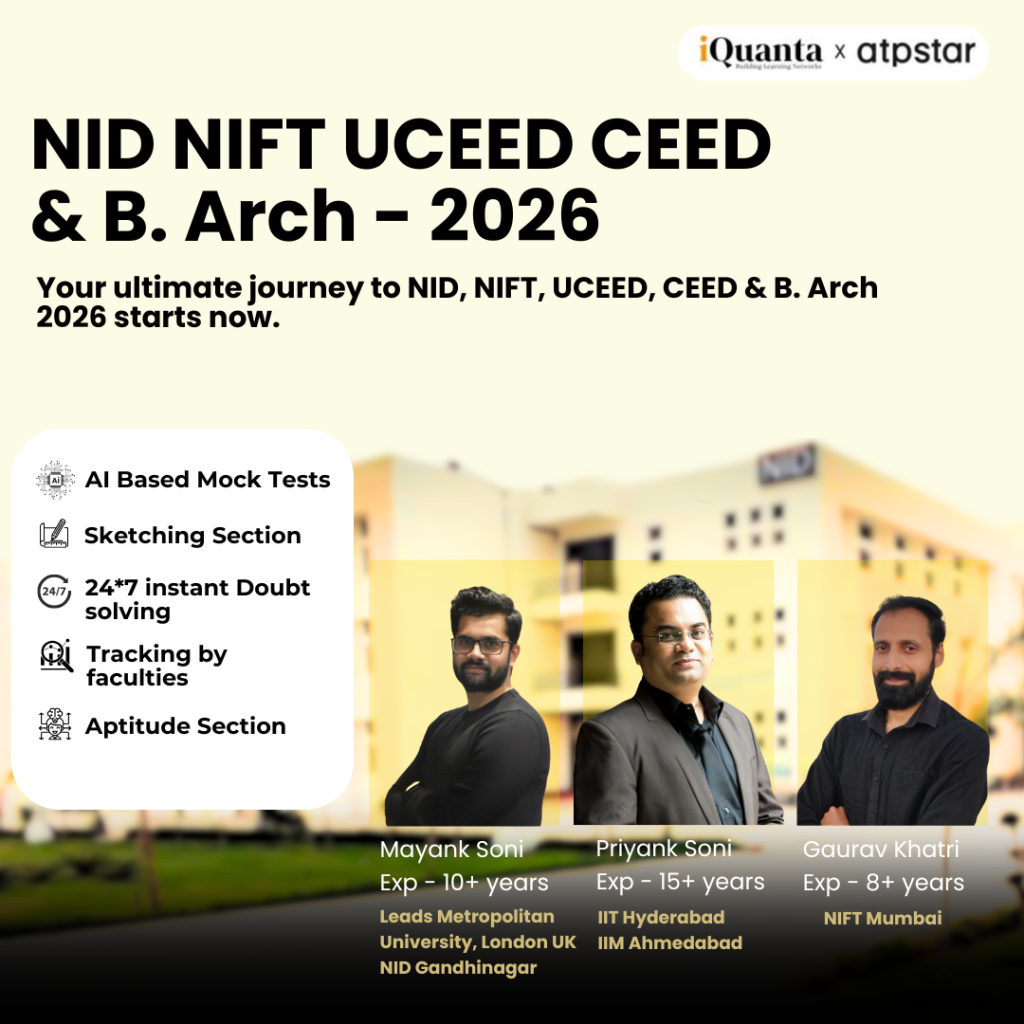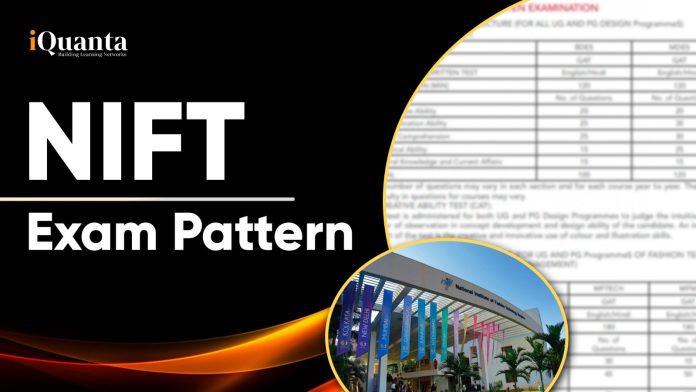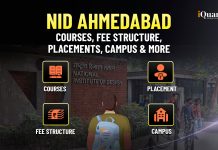The National Institute of Fashion and Technology (NIFT) conducts a national-level entrance exam for the admission of the candidates to its various UG- and PG- level courses every year. Upon clearing the NIFT entrance exam, the students can get admission to B.Des, B.F.Tech, M.Des, and MFM programs. The university conducts the exam at two levels, the Creativity Ability Test (CAT) and the General Ability Test (GAT), for giving admission to the students in the different courses they offer. Check the detailed NIFT exam pattern here:

NIFT Entrance Exam Pattern Overview
NIFT offers admission for UG and PG courses that include B.Design, B.Fashion Technology, M.Design, and M.Fashion Technology.
The NIFT entrance exam paper pattern and the syllabus vary for each course.
Tests to attend for each course are as follows:
- For B.Des, you must appear for CAT, GAT, and the Situation Test.
- For M.Des, you must appear for CAT, GAT, and GD/PI.
- For BF.Tech, you must appear for GAT.
- For M.F.Tech and MFM applicants, the selection process will be through GAT and GD/PI.

Each stage of the NIFT entrance exam will be offline. You will need to appear for a paper-based test at the respective exam center, which will be provided on the NIFT admit card. After qualifying in all stages, you will only be called in for the final admission round.
NIFT Exam Pattern for CAT
- The Creative Ability Test (CAT) is the first stage in the B.Des and M.Des selection process.
- The primary purpose of this test is to evaluate the candidates’ creative ability, power of observation in concept generation, and design skill.
- The total time required to complete the CAT exam is 3 hours.
- There will be 3 drawing questions.
- The total marks for the CAT test are 100.
- The CAT exam will test the candidates’ innovative and creative use of colors as well as their illustration skills.
NIFT Exam Pattern for GAT
After qualifying for the creative ability test, you will be shortlisted for the General Ability Test (GAT). Here are the components of the General Ability Test for the NIFT entrance exam:
- Quantitative Ability: This subset examines candidates’ quantitative ability. It consists of questions about Addition, Multiplication, Division, Fractions, Percentages, Rates of Interest, Work and Tasks, Ratio and Proportion, and Distance.
- Communication Ability and English Comprehension: This subset evaluates candidates’ language skills in daily communication. It includes questions on synonyms, antonyms, words with related meanings, singular, plural, one-word substitutes, idioms and phrases, correct spelling, comprehension passages, etc.
- Analytical Ability and Logical Ability: This subtest tests the candidates’ capacity to generate analogies and logic from given information, as well as their ability to identify the given problem and apply reasoning to solve the issue to its core. Concepts and practice for innovative and lateral thinking are likely to be beneficial.
NIFT Exam Pattern for Situation Test
After the written test, the next step is the Situation Test. This is a hands-on test to evaluate your material handling skills and innovative ability in a given situation with a given set of materials.
- Using outside/additional material to create the model/design is banned.
- The model will get evaluated based on various parameters by the respective authorities.
- These set parameters will be checked and write-up will be provided to explain the concept of of constructed model.
- The exam format of the NIFT entrance exam is English; you must prepare your write-up in English only.
- The jury will analyze the model on the spot.
Qualifiers of written exams for master’s programs will be called for Group Discussions and Interview Round.
- Group Discussion: The GD would be for 15-20 15-minute discussions around a case study assigned, on which a panel of experts will assess you on various parameters, like conceptual clarity, knowledge of the topic assigned, the contribution made to the topic, interpersonal skills, effective communication, and so on.
- Personal Interview: In PI round, you will be evaluated on parameters like, career orientation, overall personal achievements in academics and co-curricular activities, general awareness and aptitude , creative and lateral thinking, etc.
NIFT Exam Pattern: Section-wise Questions
Negative Marking: In the GAT paper, for every wrong attempt, the candidate will be deducted 25% of the total marks.
So, when attempting the GAT paper, the candidate needs to be judicious before attempting a question if they are unsure about the answer. There is no negative marking for the CAT paper, which is a drawing-based exam.
- NIFT Exam pattern: B.Des
| Paper | GAT |
| Duration of Exam | 120 minutes |
| Language | English/Hindi |
| Sections | No. of Questions Asked |
| Quantitative Ability | 20 |
| Communication Ability | 25 |
| English Comprehension | 25 |
| Analytical Ability | 15 |
| General Knowledge & Current Affairs | 15 |
| Total Number of Questions | 100 |
- NIFT Exam Pattern: M.Des
| Paper | GAT |
| Total Number of Questions | 120 |
| Duration of Exam | 120 minutes |
| Sections | No. of Questions Asked |
| Quantitative Ability | 20 |
| Communication Ability | 30 |
| English Comprehension | 30 |
| Analytical Ability | 25 |
| General Knowledge & Current Affairs | 15 |
| Mode of Exam | English/Hindi |
- NIFT Exam Pattern: B.F.Tech
| Paper | GAT (Section A) | GAT (Section B) |
| Duration of Exam | 180 minutes | |
| Mode of Exam | English/Hindi | |
| Sections | No. of questions | |
| Communication Ability & English Comprehension | 40 | NIL |
| Quantitative Ability | 20 | 15 |
| Analytical & Logical Ability | 15 | 15 |
| General Knowledge & Current Affairs | 25 | NIL |
| Case Study | NIL | 20 |
| Total Number of Questions | 100 | 50 |
- NIFT Exam Pattern: M.F.Tech
| Paper | GAT |
| Duration of Exam | 180 minutes |
| Language | English/Hindi |
| Sections | No. of Questions Asked |
| Communication Ability & English Comprehension | 45 |
| Quantitative Ability | 30 |
| Analytical & Logical Ability | 25 |
| General Knowledge & Current Affairs | 25 |
| Case Study | 25 |
| Total Number of Questions | 150 |
- NIFT Exam Pattern: MFM
| Paper | GAT |
| Duration of Exam | 180 minutes |
| Language | English/Hindi |
| Sections | No. of Questions Asked |
| Communication Ability & English Comprehension | 50 |
| Quantitative Ability | 20 |
| Analytical & Logical Ability | 25 |
| General Knowledge & Current Affairs | 25 |
| Case Study | 30 |
| Total Number of Questions | 150 |

NIFT UG Exam Weightage
| Exam | B.Des | B.F.Tech | BF.Tech candidates opting for B.Des |
| GAT (Sec-A) | 30% | 30% | 30% |
| GAT (Sec-B) | – | 70% | – |
| CAT | 50% | – | 50% |
| Situation Test | 20% | – | 20% |
| Total | 100% | 100% | 100% |
NIFT PG Exam Weightage
| Exam | M.Des | M.F.Tech | MFM |
| GAT | 30% | 70% | 70% |
| CAT | 40% | – | – |
| Personal Interview | 30% | 30% | 30% |
| Total | 100% | 100% | 100% |
Join iQuanta NIFT Coaching
Crack the NIFT entrance exam with iQunata’s well-structured and thorough course structure. Get NIFT coaching from renowned design faculties, 24*7 doubt-solving assistance, personalized preparation techniques, and relevant content to stay focused and ace the NIFT exam and gain admission to top design universities. NIFT course by iQuanta is definitely the right choice for you if you are aiming to crack the NIFT entrance exam. The course has customised modules for each section. Students are provided with the right and updated content and they get personalized attention by our esteemed mentors.
Join iQuanta and experience the new age of learning, where top-notch content meets advanced technology, expert guidance, and unwavering support. Get ready to conquer the NIFT Entrance Exam with iQuanta NIFT Online Course.

NIFT Exam Pattern 2025 – FAQs
The Situation Test/Personal Interview (PI) is the 2nd stage of the NIFT entrance exam. Candidates were shortlisted for the Situation Test/PI based on the NIFT written exam scores.
In the case of the B.Des and B.FTech programs, the candidates should be less than 24 years old as of July 1 of the admission year. There is a relaxation of 5 years for candidates belonging to SC, ST, and PwD categories. However, there is no age limit for applying to the postgraduate programs at NIFT.
The NIFT entrance exam will be conducted in 82 cities. The list of exam centers allocated to the candidate will be mentioned in the NIFT admit card.
The NIFT Lateral Entry Admission (NLEA) provides an opportunity to candidates who have completed their Diploma in relevant or related fields of Design & Technology for direct admission to the third semester of UG programs of NIFT.
Eligible candidates have to appear in the NIFT entrance exam to get lateral admission.




